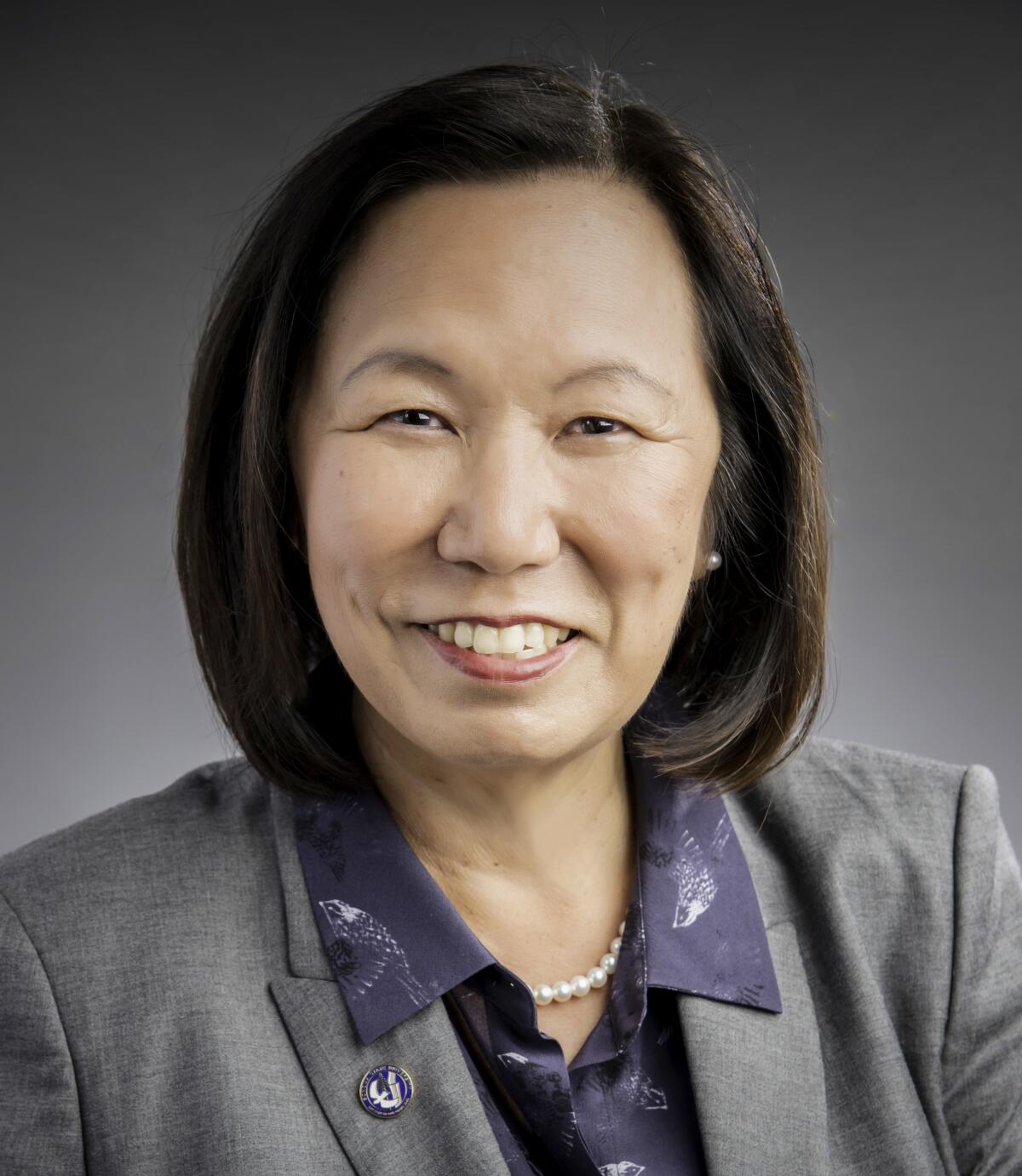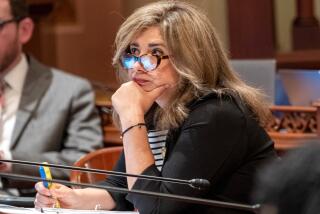Sonoma State president faulted CSU’s sex harassment response. Now she has her own scandal

Sonoma State President Judy Sakaki was part of a group of Cal State presidents who met with a top aide from the Assembly speaker’s office in February to say they had lost confidence in the system chancellor over his handling of a sexual harassment case, The Times has learned.
Sakaki now faces a revolt from some faculty on the Academic Senate at her own campus who are drafting a resolution for a no-confidence vote in her leadership after a Times investigation detailed accusations of sexual harassment and retaliation involving Sakaki and her husband.
Records show that just weeks before the Feb. 15 phone meeting with Assemblyman Anthony Rendon’s office, Sakaki signed a settlement in which CSU agreed to pay $600,000 to resolve a legal claim filed by a former provost who reported the harassment allegations against the president’s husband, lobbyist Patrick McCallum, and alleged that Sakaki then retaliated against her. A Rendon spokeswoman confirmed that the meeting took place and said the speaker had been unaware of the settlement when Sakaki and four other CSU presidents met with his higher education aide.
A Cal State alumnus, Rendon (D-Lakewood) is a member of the CSU Board of Trustees and shared his concerns about Chancellor Joseph I. Castro with other trustees during a closed-door meeting on Feb. 17, his spokeswoman, Katie Talbot, told The Times. At the end of that day-long session, Castro announced his resignation over his handling of sexual harassment, bullying and retaliation accusations against a top administrator while he was president of Fresno State.
University President Judy Sakaki announced the separation days after a Times investigation detailed reports of sexual harassment by her husband.
During the meeting with Rendon’s office, Sakaki and other presidents said they and other top administrators across the nation’s largest four-year public university system had lost confidence in Castro, according to a campus president who took part in the discussion.
“We had lost confidence in, and lacked confidence, in our leader,” said the president, who asked not to be named to be able to discuss the private meeting with Rendon’s office.
The state senator who represents the district that includes Sonoma State told The Times Wednesday that the latest disclosure about Sakaki’s meeting with the speaker’s office smacked of “hypocrisy.”
“It’s hard not to see hypocrisy, and now I’m hearing clearly that there’s a lack of confidence in her leadership,” Sen. Bill Dodd (D-Napa) said in a statement.
Sakaki did not respond to messages seeking comment. Sakaki and McCallum previously issued statements to The Times saying they had done nothing wrong. Sakaki denied retaliating against then-Provost Lisa Vollendorf, declaring that the accusations “are utterly without basis.”
In January, Sakaki signed a settlement agreement with Vollendorf, who alleged she faced retaliation from the president, her boss, after she reported the sexual harassment accusations about McCallum to the CSU general counsel, records in the case show.
McCallum is an official campus volunteer who has attended many university events with his wife. He also is a veteran lobbyist for higher education associations and victims who lost homes in wildfires in recent years. McCallum and Sakaki lost their Santa Rosa house in the 2017 Tubbs fire, which killed 22 people and destroyed more than 5,000 homes.
On Wednesday, the retired appellate court judge who oversees the Fire Victim Trust — a fund set up to pay PG&E Corp. wildfire victims — announced that it was no longer retaining McCallum as a lobbyist. “We want our entire focus to be on what we’re doing to help fire victims rebuild their lives, not on unrelated issues that have become a distraction in recent days,” John K. Trotter said in a statement.
The disclosures about the allegations and settlement have unleashed simmering tensions on the Sonoma campus, where faculty leaders have voiced concerns about dropping student enrollment and whether Sakaki can continue leading the campus in light of the scandal involving her and her husband.
On Monday, Sakaki announced she was separating from McCallum, saying he sent emails to family and friends about the scandal that she described as “inaccurate and unauthorized.” The emails referenced “hurtful allegations” and criticized Vollendorf, according to an email that was reviewed by Times reporters.
The Academic Senate’s executive committee will discuss a vote of no confidence for Sakaki at its meeting on Thursday. Senate Chair Lauren Morimoto expects the committee to put the no-confidence vote on the Senate agenda for the following week.
Professor Talena Sanders, who’s helping to draft the no-confidence resolution, said the scandal is a tipping point for many who have voiced frustration over Sakaki’s leadership in the midst of an ongoing drop in enrollment.
“I think this has become such a big distraction, to put it mildly, that there’s no effective way she can lead the university. She’s already been failing as a leader in so many ways with our budget and enrollment crisis,” said Sanders. “The faculty has been dissatisfied for a while. Morale has been low for a while.”
The CSU has experienced a systemwide decrease of roughly 13,000 students over the past year, the Assembly Budget Committee on Education Finance estimated at a recent hearing. But a handful of universities, including Sonoma State, have been affected more than others.
Sanders linked the current events around Sakaki to former Chancellor Castro’s handling of sexual misconduct allegations when he was president of Fresno State. In 2019, weeks before he was named chancellor, Castro approved a $260,000 payout and retirement benefits to a former Fresno State vice president of student affairs who had been accused of sexual harassment and workplace bullying over a six-year span. Castro resigned in February amid an outcry over the settlement, which was authorized by former Chancellor Timothy P. White.
“This seems to be a failure from the Chancellor’s Office to adequately investigate its own protocol ... I think there needs to be an outside investigation into this entire situation,” Sanders said.
CSU paid $600,000 to settle a former Sonoma State provost’s legal claim that she suffered retaliation after reporting sexual harassment by the university president’s husband.
The Times’ investigation of Sonoma State detailed Vollendorf’s reports to the CSU about the allegations against McCallum. Vollendorf is a longtime higher-education administrator and was recently appointed as president of State University of New York Empire State College.
Vollendorf said she told the general counsel in December 2018 that three women — two of them campus employees — alleged McCallum talked about his sex life, ran his fingers through one woman’s hair and then made “inappropriate personal comments” about her appearance during a party at his house, according to settlement records that the provost’s attorney filed with system officials.
The women, who reported the accusations to Vollendorf because they worked for her or knew her, described the behavior as “creepy,” “disgusting” and “pervy,” the records said.
The Times’ investigation noted that Vollendorf provided CSU officials with the names of the three women and three more people who said they witnessed such conduct.
Cal State officials acknowledged that they did not launch a formal investigation into the sexual harassment claims and instead spoke to Sakaki about the accusations against her husband.
They said CSU’s former Title IX officer interviewed three people — two complainants and an apparent witness — about the allegations. One person declined to be interviewed. CSU officials said that those interviewed declined to proceed. Officials denied Vollendorf was subjected to retaliation.
Two complainants, who spoke with The Times on the condition of anonymity, said that fears of job loss and damage to the president’s reputation prompted them not to go forward. One complainant said she later told the Title IX officer that she believed Sakaki had retaliated against her over the claims.
A former interim vice president at the university told The Times that he reported similar allegations in 2019 against McCallum on behalf of his staff to general counsel Andrew Jones, but that no one followed up with him.
Gordon McDougall, who directed Sonoma State’s University Advancement Division before retiring in 2020, said he changed schedules to prevent women on his team from working with McCallum during campus events following “complaints of inappropriate touching and comments.”
More to Read
Sign up for Essential California
The most important California stories and recommendations in your inbox every morning.
You may occasionally receive promotional content from the Los Angeles Times.













